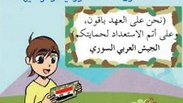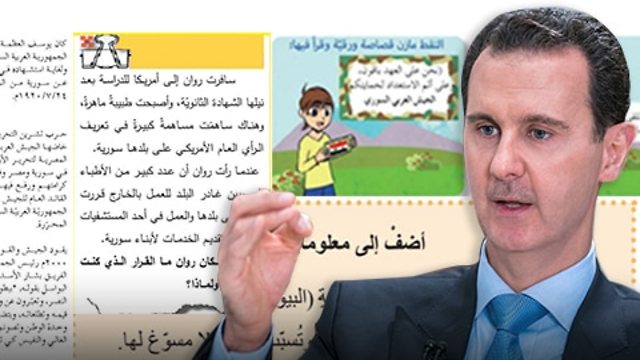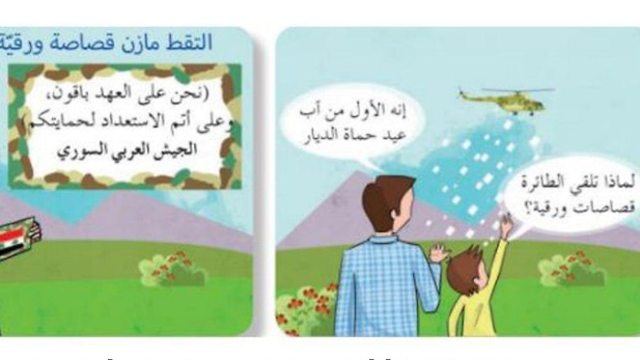
Syrian school textbooks repeatedly accuse Israel of stealing lands in order to "fabricate Arab-Syrian history", and make no mention of Hezbollah or the Holocaust, according to a new study that provides information about school curriculum in Syria in the wake of the Syrian civil war.
Syrian students are exposed to anti-Semitic content encouraging Jihad and acts of terrorism.
The study was written by Dr. Eldad Pardo and Maya Yaakobi from the Institute for Monitoring Peace and Cultural Tolerance in School Education (IMPACT-SE).
Since 1998, the organization has explored and analyzed official textbooks from all over the globe to determine their compliance with international educational standards of peace and tolerance .
In the report, the writers analyze Syrian official textbooks for the 11th and 12th grades used in the 2017-2018 academic year, in areas controlled by President Bashar Assad's regime.
One of the most serious accusations against Israel, which is repeated several times in various textbooks, is that it "forces Zionist identity on the Golan's population," enforcing the Hebrew language on the Syrian Arab residents, and Judaization.
Israel is consistently referred to as a "Zionist entity," its territory is called "Palestine" or "occupied Palestine" and the entire geographical area is presented as "the homeland of the Arabs."
In addition, "the Zionists" are accused of destroying the natural environment of the Golan and exploiting the region's economic and tourism potential, as well as preventing the economic prosperity of its residents. Zionists are further accused of plotting to replace Syrian education with the "Zionist and terrorist entity's plans", in order to keep Syrian Arab citizens "in the dark."
Similarly, in almost every study conducted by researchers looking into incitement in Palestinian textbooks, materials have been found which breach the Palestinian Authority's pledges to halt anti-Israel incitement in schools.
Authors of the report also studied Russian culture and language. In 2014 the studying of the Russian language became mandatory in Syrian schools, the report says, while Persian is not taught.
The textbooks present Syria as a scientific and technological pioneer. Among other things, the textbooks' publishers teach about key Russian figures such as Yuri Gagarin, the first Russian cosmonaut. Iran, on the other hand, is mentioned with a certain degree of hostility.
According to the report's editors, this may indicate the Syrian intention to establish long-term relations with Russia, while Iran is considered by the regime as a source of temporary and local assistance that cease when it is no longer needed.
No mention of Hezbollah and the Holocaust
The Syrian textbooks make no mention of the Hezbollah terror group, the civil war that has been raging in the country for the last seven years, or the effects of war on the daily lives of the population.
Seven years of intense and bloody fighting have completly transformed Syria's reality, and it will take many years to rehabilitate the devastated country. The fighting affected all aspects of life in the region as hundreds of thousands of Syrian residents became refugees. Syria's economy, transportation system, health care, jobs and education were all shattered by the fighting.
As part of the Assad regime's attempts go about "business as usual", the government published information about the Syrian education system at the beginning of July. According to the data published, 5,504 new teachers joined 11,329 teachers who were hired in January. The teachers will be integrated into a large number of schools throughout various fields of study.
In addition, propaganda is frequently used to disseminate falshoods about the government through the education system, with the aim being to restore confidence of the Syrian people in the government, to show that daily normality is slowly returning, and to paint a misleading image of a functioning education system.
In the past month, pictures of refugees returning to their homes were published almost daily by the Syrian regime.
The Syrian and Arab nationalism apparent in the textbooks rejects the Shi'ite-Iranian hegemony and views it as a threat. The Khomeinist political culture and Iran's lifestyle are rejected by the Syrian curriculum, with the exception of one common enemy— Israel and the West.
IMPACT-SE's CEO, Marcus Sheff, commented on the textbook: "While Syrian children witness the civil war raging around them, their textbooks give no explanation for this war. There is no hope that Syria will moderate its traditional Ba'athist hostility towards Israel even after the end of this terrible civil war," he said.
"The rhetoric remains: Israel is a terrorist state and therefore all means are legitimate in the war against it, including terror and suicide attacks. In fact, even when Syria is engaged in war, in front of the nation's children, hostility towards Israel remains a central tenet of the Syrian curriculum."
The Syrian curriculum allocates a very prominent place for nationalism, patriotism and the teaching of loyalty to the country and the regime. The textbooks are rife with nationalist messages, portraying Hafez al-Assad, the late father of the current Syrian tyrant, as a national hero whose footsteps are being followed by his son Bashar with "courage and bravery."
The section about the army, titled "Society," describes the army as an integral part of Syria. One of the authors of the report, Dr. Eldad Pardo, states: "The present Syrian curriculum does not deal with morality, introspection or peace education. Instead, it holds a radical militaristic and pan-Arab world view. It teaches that the international community justifies 'resistance' by using all 'available means' to destroy the enemy. With regard to World War II, the Holocaust is not mentioned in Syrian textbooks since Jews are 'liars' who cannot be trusted."




















